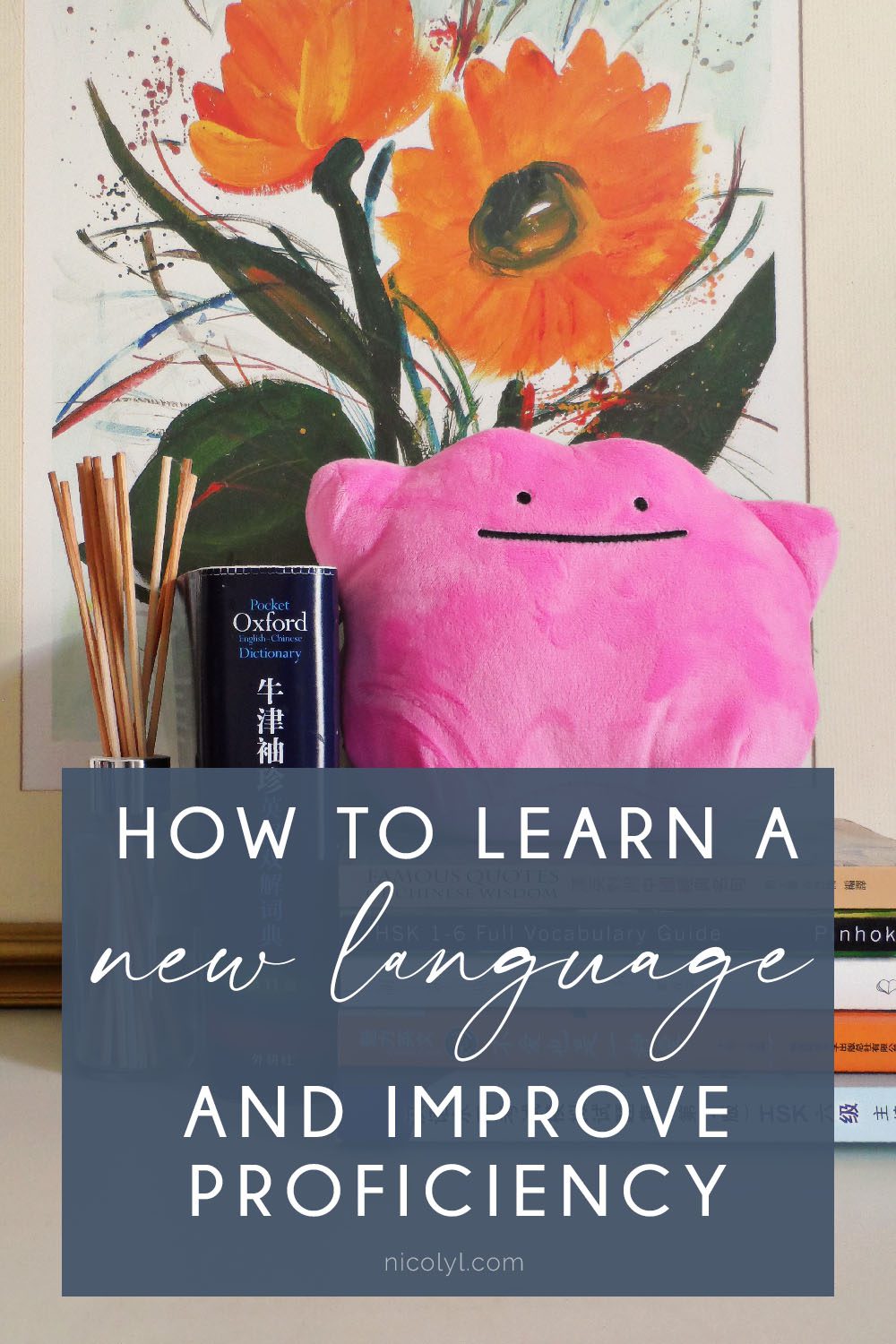
Languages intrigue me. I’m always constantly improving my own Chinese proficiency which is now at an advanced level in all aspects, yet it’s still not enough for me personally. I have learnt other languages over the years through school or self-study but haven’t really surpassed the basic level in any of them. They’re all at different levels of basic:
Spanish (better out of the four, it’s my next language to master),
French (GCSE level but had forgotten 98% of it, numbers and basic greetings are all I remember),
Korean (my addiction to K-Dramas and K-pop had started this. I still remember hangul, romanisation and the basic greetings),
Japanese (extracurricular class during my sixth form days, the worst out of the four).
Thought I’d share some tips and tricks on how you can learn a new language and or improve your current proficiency. I have adopted these methods myself over the years and have proved to be useful.
Every language compromises of 4 core skills: reading, writing, listening and speaking. They all intertwine with one another. It’s natural if your proficiency in some of these skills is stronger than others. Some are better at reading and writing, whilst some are better at listening and speaking. I wonder if it has any correlation as to what type of learner you are: visual, auditory or kinaesthetic?
Learn the Language’s Core Foundations
For any given language, learning the language’s phonetics and phonology is the main foundation which everyone will need to master. Think back to when you were a child learning your ABCs, consonants, vowels, phonic rules etc. The process will be the same. I remember having to learn the French alphabet in school which I’ve sadly completely forgotten. There will be sounds that are unique in one or a few languages and doesn’t exist in the English language. These sounds may be difficult for native English speakers but it’s not impossible, e.g. trill/rolling r, present in Spanish, Russian and Italian. I really want to learn to do this myself, as I think it’s sexy! Haha.
For languages that aren’t a phonetics based language, such as Chinese, you will still need to learn its core elements which will have some sort of phonetics/romanisation system. Using Mandarin Chinese as an example, you’ll need to learn their romanisation system, pinyin (汉语拼音), and the tones. Then you’ll be able to move onto the strokes and everything about them such as forms, stroke order, structure, radicals etc. This was how I was taught.
Once you have a solid foundation, you’re then able to move one and start learning the vocabulary and grammar.
Random story: Whilst on an overnight sleeper train in China, I was talking to a native and he told me that at his school, he was taught the International Phonetics Alphabet (IPA), which is based on the Latin script, in order to learn English. He was surprised that we don’t learn it in the UK. This was fascinating and am not sure if this teaching method is widely used across China.
Learn the Culture
This is probably the second most important point. It is absolutely fundamental you learn the culture as it will impact you. Learning the language only doesn’t signify you understand how the natives think. If you don’t learn, you won’t understand the roots, the development, the reasoning and everything that surrounds the language itself. In a way, you are losing that cherry on top, it’s incomplete. One’s culture has helped evolve and shape the language today. Without insight, you are losing out on the important context and those memes. Culture and language go hand in hand.
Understanding the culture will help you learn their mannerisms, gestures, values and customs which will be reflected in the way we write and speak to others. It is especially important when conducting business internationally. Learning the culture shows the level of respect you have towards others. No matter how highly skilled you are in a language, if your understanding of the culture is poor, there is a good chance of offending others when there is zero intention.
Enrol on a Course
This is probably the best thing to do regardless of your proficiency level. If you have the opportunity, study abroad. This will give you the greatest advantages, immersing yourself in the culture and environment, as well as interacting with the locals. Probably one of the quickest way to pick up a language. Even if you’ve enrolled on a course in your local area, it’s still a big advantage as you have teachers helping you.
Not everyone has the privilege of studying abroad. It’s understandable if you’re not able to join and attend a course locally due to work, commitments, finances, whatever the reason. It’s not the end of the day as there are many free and paid online ones too. There’s the option of an online tutor too.
Make Use of Apps
Busuu, Duolingo, Babbel, Memrise, iTalki, HiNative, HelloTalk are some examples of popular language apps people use.
Apps are a great starting point to teach you the basics but there are limitations to them. They can only teach you so much but don’t count on them to take you from zero to fluent. Don’t expect them to give you a detailed explanation on what, when, why and how. It can be more of a mesmerising game as compared to actually learning depending on your learning style. Don’t let this put you off though. It can be a great motivation to kick you into gear when you receive a notification from the Duolingo owl reminding you to get your daily practice in. So many memes pop straight to mind.
If you have questions and don’t know where to go, sign up to apps, like HiNative, and natives and other learners will help you. No matter how simple or complicated the question is, ask away. You can ask how your pronunciation is, request pronunciation, examples of words used in sentences etc. I’ve used HiNative a lot and the answers I’ve received have always been helpful, giving me clarity when I was confuzzled.


Good Ol’ Textbooks
To my fellow Brits, do you remember receiving and using CGP textbooks at some point during KS2, KS3, GCSE, AS/A Level and quite possibly at primary school? If you’ve still got the language books hidden away, collecting dust somewhere, bring them back out and use them. Or just purchase textbooks, any textbooks. It doesn’t have to be CGP.
Textbooks are probably the best way to learn and study vocabulary, grammar and improve your reading skills. Purchase the workbooks too. Understanding and being able to read the grammar doesn’t equate to being able to write it yourself. Test yourself and don’t cheat. The more you read, write, speak, listen, the more it sticks.
Practice with a Native Speaker
I would say, this is probably one of the best ways to help you improve. I personally find conversing with a native helps me remember vocabulary a lot easier, improve my pronunciation as well as losing my English accent to sound more like a native. The more you converse with natives, you’ll be able to pick up some good habits and slang.
Don’t be afraid to make mistakes in front of them or ask questions. It’s not an embarrassing moment.
Read Literature, Listen to Audiobooks
At beginners level, don’t be ashamed to start reading children’s books. It’ll contain the grammar and sentence structure to start you off. If you’ve already got a grasp on the basics of grammar, then maybe start with teen books. It’s not good only knowing the vocabulary. You need to understand the meaning, how they are used, their classes, formal or informal etc. It’s all about working your way up, further building your core.
By reading, you’ll learn to understand how natives would express themselves through writing, understanding the tone, commonly used expressions whilst increasing your range of vocabulary. It’ll help you think more like a native and less like a foreigner. Sometimes, the way we express things in English isn’t easily translatable to other languages as there is no direct equivalence in terms of phrasing and or the meaning can get lost in translation. If a book you’ve previously read has a translated version, go for the translated version. You’ll be familiar with the storyline, characters, know what to expect so there’s no second-guessing.
Whatever you’re reading, make notes, scribble directly on the pages or on a separate notebook. Translate any unfamiliar words encountered. The chances of that word reappearing a few pages later are very high. Analyse the spelling/strokes then you’ll retain it a lot easier whilst it frequently reappears.
READ OUT LOUD. I can’t preach this loud enough. If you don’t know how to pronounce something, use an app or a translator to listen to the pronunciation then write the pronunciation in your own way. Read along to an audiobook or a CD if it comes with one. Listen and repeat after each sentence. Mimic it. If you’re confident enough, listen to the audiobook only. Even record yourself and listen back if the sound of your own voice doesn’t terrify or make you cringe.
Watch Films, TV Series
If you need a reason to sit on your arse binging watching, then this is an awesome opportunity. It’s the perfect excuse really. On the contrary to the previous point, the difference between reading books and watching TV and films is the way it can help you with listening and speaking skills the most. You’ll be able to pick up more colloquialism and slang. Yes, it might be scripted but they are written to depict everyday language, no matter the genre. Well, unless it is ancient history then it will differ, but intriguing to listen to how language has developed.
Grab a pen and notepad ready, be prepared to endlessly press the play and pause button to death, jot down vocabulary, rewatch a particular scene over and over again with and without subtitles.
For beginners, turn on the subtitles (don’t you dare select it in your native language). Read and do everything mentioned in the previous paragraph.
Don’t Aim to Be Fast
In my opinion, fluency doesn’t equate to being fast at everything. You might be able to read fast but do you truly understand the context and deeper meaning? You might be able to speak fast but is your pronunciation clear, smooth, and or using the correct tones if applicable? These are of greater importance than speed. As you build up your fluency, you’ll naturally start to become faster.
From a personal encounter, a girl in a hostel had asked me to help her with English, to test her so I kindly agreed. She started by reading out loud as fast as she could, however, with all due respect, I couldn’t understand 80%. Reading the paragraph myself, I had proceeded to test her but sadly, she wasn’t able to answer as she didn’t fully grasp what she had just read. I gave her some helpful advice and to slow it down a bit. I don’t think I personally know anyone who speaks at the speed she was doing.

Look into Standard Proficiency Tests
English: TOEFL, IELTS
Spanish: DELE
French: DILF, DELF
Mandarin: HSK (listening, reading and writing only), HSKK (oral only)
German: TestDaF
Korean: TOPIK
Japanese: JLPT
These are some examples of the proficiency test people take globally for university admittance and or jobs. Do look into the standardised tests as they generally contain the commonly used vocabulary and grammar structures at all levels. It doesn’t matter whether you’re planning on taking these tests or not, they are 101% useful in giving you a great insight overall. You’ll be able to find a list of every vocabulary and grammar for every level floating around the internet, apps, textbooks etc so do take advantage of them. Why not use past papers to test yourself to see what you’re level is.
Just because there is a setlist in vocabulary doesn’t mean you have to restrict yourself to just learning that set. These tests tend to be of general, everyday life as opposed to specialised areas. Use them as a guide to help you with your language journey.
I hope these tips are of use to anyone looking to learn and improve a language, regardless of your level. I would love to hear any other tips you may have which I can also incorporate into my routine.
Pin for Later

上一篇
下一篇